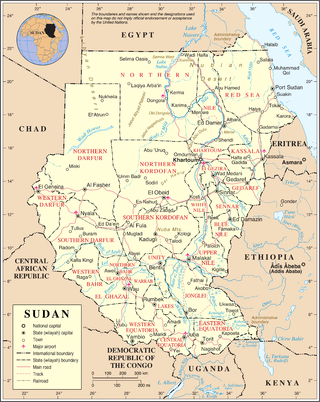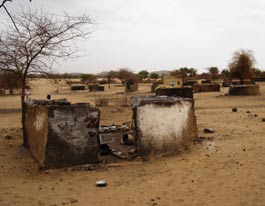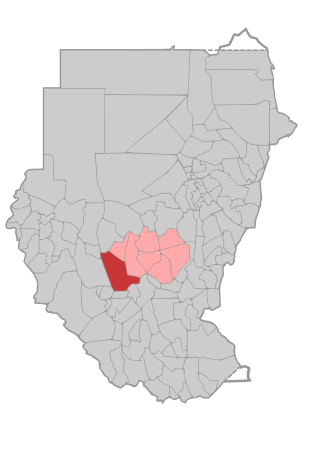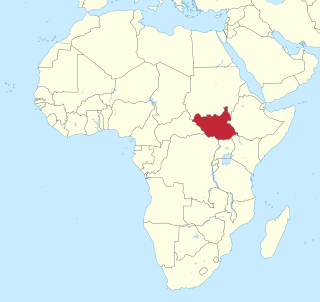
The United Nations Mission in the Sudan (UNMIS) was established by the UN Security Council under Resolution 1590 of 24 March 2005, in response to the signing of the Comprehensive Peace Agreement between the government of the Sudan and the Sudan People's Liberation Movement on January 9, 2005, in Sudan.

The African Union Mission in Sudan (AMIS) was an African Union (AU) peacekeeping force operating primarily in the country's western region of Darfur to perform peacekeeping operations related to the Darfur conflict. It was founded in 2004, with a force of 150 troops. By mid-2005, its numbers were increased to about 7,000. Under United Nations Security Council Resolution 1564, AMIS was to "closely and continuously liaise and coordinate ... at all levels" its work with the United Nations Mission in Sudan (UNMIS). AMIS was the only external military force in Sudan's Darfur region until UNAMID was established. It was not able to effectively contain the violence in Darfur. A more sizable, better equipped UN peacekeeping force was originally proposed for September 2006, but due to Sudanese government opposition, it was not implemented at that time. AMIS' mandate was extended repeatedly throughout 2006, while the situation in Darfur continued to escalate, until AMIS was replaced by UNAMID on 31 December 2007.

United Nations Security Council Resolution 1706, adopted on August 31, 2006, after recalling previous resolutions on the situation in Sudan, including resolutions 1556 (2004), 1564 (2005), 1574 (2004), 1590 (2004), 1591 (2005), 1593 (2004), 1663 (2006), 1665 (2006) and 1679 (2006), the Council expanded the mandate of the United Nations Mission in the Sudan (UNMIS) to include deployments in Darfur to enforce the Darfur Peace Agreement.

United Nations Security Council Resolution 1923 was adopted unanimously on 25 May 2010, after recalling resolutions 1769 (2007), 1778 (2007), 1834 (2008), 1861 (2009), 1913 (2010) and 1922 (2010). The Council extended the mandate of the United Nations Mission in the Central African Republic and Chad (MINURCAT) for a final time until 31 December 2010, with a complete withdrawal by that date.
United Nations Security Council Resolution 1935, adopted unanimously on July 30, 2010, after reaffirming all previous resolutions and statements on the situation in Sudan, the Council extended the mandate of the African Union – United Nations Hybrid Operation in Darfur (UNAMID) for a further 12 months until July 31, 2011 and demanded an end to fighting and attacks on United Nations personnel and civilians.

United Nations Security Council resolution 1547, adopted unanimously on 11 June 2004, after welcoming the commitment of the Sudanese government and Sudan People's Liberation Army/Movement (SPLA/M) to work towards a full ceasefire and peace agreement to end the Second Sudanese Civil War, the council established a United Nations Advance Team in Sudan to prepare for a future United Nations operation following the signing of the Comprehensive Peace Agreement. The brief reference to the situation in the Darfur region divided Council members, with Algeria, China and Pakistan against a mention of Darfur and the other two-thirds of the council supporting its inclusion.

United Nations Security Council Resolution 1945, adopted on October 14, 2010, after recalling previous resolutions on the situation in Sudan, the Council extended the mandate of an expert panel monitoring an arms embargo and other sanctions on groups that "impede peace in Sudan" until October 19, 2011.

United Nations Security Council resolution 1556, adopted on 30 July 2004, after recalling resolutions 1502 (2003) and 1547 (2004) on the situation in Sudan, the council demanded that the Sudanese government disarm the Janjaweed militia and bring to justice those who had committed violations of human rights and international humanitarian law in Darfur.

United Nations Security Council Resolution 1574, adopted unanimously at a meeting in Nairobi, Kenya, on 19 November 2004, after recalling resolutions 1547 (2004), 1556 (2004) and 1564 (2004), the council welcomed political efforts to resolve the conflicts in Sudan and reiterated its readiness to establish a mission to support the implementation of a Comprehensive Peace Agreement.

United Nations Security Council Resolution 1590, adopted unanimously on 24 March 2005, after recalling resolutions 1547 (2004), 1556 (2004), 1564 (2004), 1574 (2004), 1585 (2005) and 1588 (2005) on the situation in Sudan, the Council established the United Nations Mission in Sudan (UNMIS) for an initial period of six months.

United Nations Security Council resolution 1627, adopted unanimously on 23 September 2005, after recalling previous resolutions on the situation in Sudan, particularly Resolution 1590 (2005), the Council extended the mandate of the United Nations Mission in Sudan (UNMIS) for six months until 24 March 2006.

United Nations Security Council Resolution 1978, adopted unanimously on April 27, 2011, after recalling all previous resolutions on the situation in Sudan, the Council extended the mandate of the United Nations Mission in Sudan (UNMIS) until July 9, 2011 and announced its intention to create a successor mission.

United Nations Security Council Resolution 1663, adopted unanimously on March 24, 2006, after recalling previous resolutions on the situation in Sudan, particularly 1627 (2005) and 1653 (2006), the Council extended the mandate of the United Nations Mission in Sudan (UNMIS) for six months until September 24, 2006.

United Nations Security Council Resolution 1990, adopted unanimously on June 27, 2011, after recalling all previous resolutions on the situation in Sudan and the Comprehensive Peace Agreement, the Council established the United Nations Interim Security Force for Abyei (UNISFA) in the disputed Abyei region between Sudan and South Sudan.

United Nations Security Council Resolution 1996, adopted unanimously on July 8, 2011, after welcoming the independence of South Sudan from Sudan, the Council established the United Nations Mission in the Republic of South Sudan (UNMISS) for an initial period of one year.

United Nations Security Council Resolution 1714, adopted unanimously on October 6, 2006, after recalling previous resolutions on the situation in Sudan, particularly resolutions 1590 (2005), 1627 (2005), 1653 (2006), 1653 (2006), 1663 (2006), 1679 (2006), 1706 (2006) and 1709 (2006), the Council extended the mandate of the United Nations Mission in Sudan (UNMIS) until April 30, 2007.

United Nations Security Council Resolution 2003, adopted unanimously on July 29, 2011, after reaffirming all previous resolutions and statements on the situation in Sudan, the Council extended the mandate of the African Union – United Nations Hybrid Operation in Darfur (UNAMID) for a further 12 months until July 31, 2012.
United Nations Security Council Resolution 1784 was unanimously adopted on 31 October 2007.
United Nations Security Council Resolution 1870, unanimously adopted on 30 April 2009, extended the mandate of the United Nations Mission in Sudan for another year urging all parties to comply fully with the 2005 Comprehensive Peace Agreement that ended a 21-year civil war between north and south Sudan.
United Nations Security Council Resolution 1812 was adopted unanimously on 30 April 2008.















